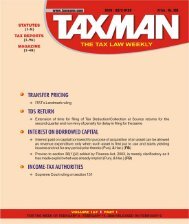CPT V24P7-Art1 (Content).pmd - Taxmann
CPT V24P7-Art1 (Content).pmd - Taxmann
CPT V24P7-Art1 (Content).pmd - Taxmann
You also want an ePaper? Increase the reach of your titles
YUMPU automatically turns print PDFs into web optimized ePapers that Google loves.
Landmark Rulings<br />
under an agreement and agreed not to engage<br />
in any call centre, BPO and IT-enabled services<br />
for a period of two years and also agreed not<br />
to solicit business done by company ‘E’. Company<br />
‘P’ also acquired certain shares from another<br />
director to increase its shareholding in company<br />
‘E’ up to 50%. The assessee showed the gain<br />
on transaction as capital gain. During assessment<br />
the AO taxed it as business profits on the ground<br />
that the shares were not held as capital assets.<br />
The Tribunal held in favour of revenue - It was<br />
held that the gain from transactions was to be<br />
taxed as business profits under section 28(va)<br />
on the following grounds:<br />
(a) The shares of company ‘E’ were not<br />
purchased by the assessee as an investor,<br />
as he was the original founder/promoter<br />
of the company;<br />
(b) Investment made by the assessee was in<br />
the nature of business asset of the assessee;<br />
and<br />
(c) The company ‘P’ had purchased 50 per<br />
cent of the entire equity shares of company<br />
‘E’. Therefore, the transfer of shares<br />
by the assessee to company ‘P’ was not<br />
the transfer of a capital asset within the<br />
meaning of section 2(14) but was, in fact,<br />
a transfer/renunciation of control over<br />
the company ‘E’ in favour of the purchaser<br />
‘P’.<br />
Therefore, the gain arising in the said transaction<br />
could not be taxed as capital gain under section<br />
45 or under section 50B and had to be assessed<br />
as business income under section 28(va).<br />
694<br />
When matter is remanded, section 220(2)<br />
interest is to be charged from the date<br />
of fresh demand notice<br />
In CIT v. Chika overseas (P) Ltd. [2012] 23<br />
taxmann.com 315 (Bombay), demand was raised<br />
against the assessee by an assessment order.<br />
On appeal filed by assessee, the CIT(A) partially<br />
allowed the claim of assessee. Subsequently,<br />
the Tribunal set-aside the order of AO and<br />
August 1 to 15, 2012 u TAXMANN’S CORPORATE PROFESSIONALS TODAY u Vol. 24 u 74<br />
}<br />
directed the AO to pass a fresh assessment<br />
order. Fresh assessment order was passed by<br />
AO and, consequently, fresh demand notice<br />
was served on the assessee. Assessee paid the<br />
demand after expiry of thirty days from the<br />
date of service of demand notice. AO held that<br />
assessee was liable to pay interest under section<br />
220 from the date of original demand notice,<br />
as demand was paid beyond 30 days from the<br />
date of service of notice. CIT(A) held in favour<br />
of assessee. The Tribunal also upheld the order<br />
of CIT(A).<br />
The High Court held in favour of assessee -<br />
It held that since demand had finally crystallized<br />
on fresh assessment order, assessee was not<br />
liable to pay interest under section 220 for<br />
period prior thereto. Therefore, assessee was<br />
liable to pay interest for non-payment of demand<br />
from the date of fresh assessment order.<br />
Production of media content software<br />
on beta-cam tape qualifies for deduction<br />
under section 10B<br />
In Asstt. CIT v. Sri Adhikari Brothers Television<br />
Network Ltd. [2012] 23 taxmann.com 322/137<br />
ITD 154 (Mum. - Trib.), assessee set-up a new<br />
unit for production of media content software<br />
which was exported on beta-cam tape to foreign<br />
parties. AO denied claim of deduction under<br />
section 10B on ground that production of a<br />
media content programme on a beta-cam tape<br />
could not be equated with an article or thing<br />
and, therefore, assessee did not satisfy basic<br />
condition of manufacture and production of<br />
an article or a thing prescribed in section 10B.<br />
The Tribunal held in favour of assessee - It<br />
was held that incorporeal rights contained in<br />
beta-cam tapes are ‘goods’ or ‘merchandise’.<br />
As a result, production of media content software<br />
on beta-cam tape qualifies for deduction under<br />
section 10B, as it amounts to ‘goods’ or<br />
‘merchandise’. Therefore, the assessee’s claim<br />
to allowability of deduction under section 10B<br />
was upheld.<br />
}<br />
}











![“FORM NO. 3CEB [See rule 10E] Report from an ... - Taxmann](https://img.yumpu.com/45480232/1/190x245/form-no-3ceb-see-rule-10e-report-from-an-taxmann.jpg?quality=85)





